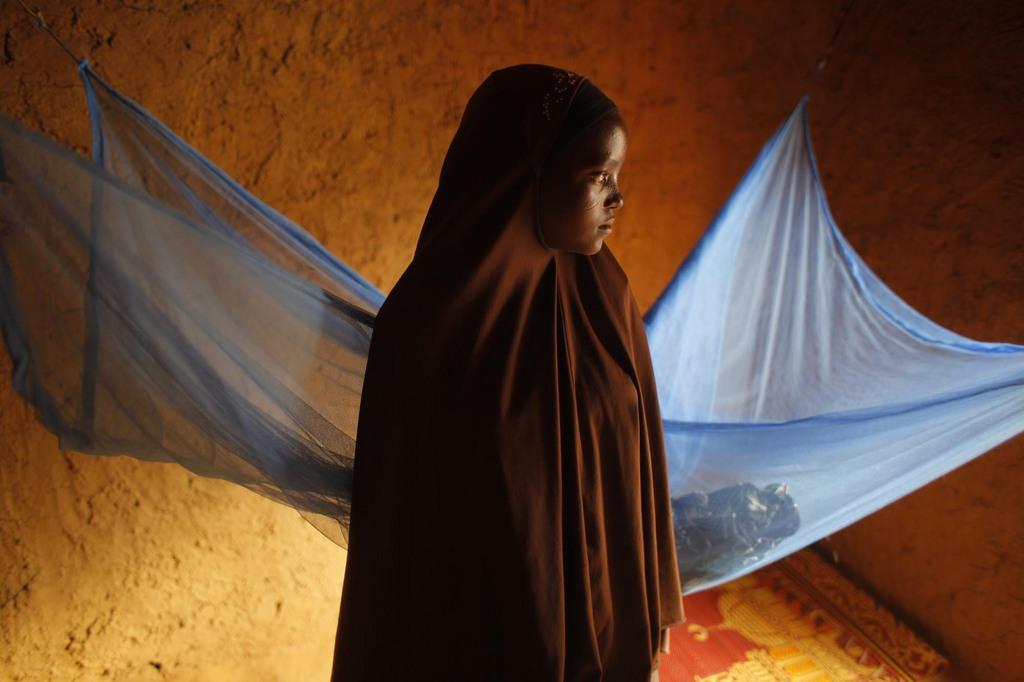Overpopulation vote stirs debate on root cause

Swiss environmentalists want 10% of Swiss development aid to be devoted to family planning measures in poor countries. A vote issue in November, both sides at least agree that investing in female education could put the brakes on population growth.
Twice a month small groups of men meet under the shade of a tree or in the village square in the west African country of Niger. They are not there to discuss how “Menas”, the Nigerien football team is faring or to indulge in a spot of “Lutte Traditionnelle”, the popular sport of traditional wrestling but to attend the “school for husbands” initiated by the United Nations Population Fund (UNFPA).
The purpose of these improvised schools is to educate Nigerien men on the importance of contraception and convince them of the benefit of giving their wives access to reproductive health care.
Niger has the world’s highest total fertility rate. It currently stands at an average of 7.6 children per family according to the 2012 survey by the Nigerien government. With over 17 million inhabitants, the country’s population is predicted to increase to 69 million by 2050 and 203 million by 2100.
Niger is also a priority country for Swiss Agency for Development Cooperation (SDC) as it was ranked last in UN Development Programme’s Human Development Index for 2013. This could make the country one of the prime candidates for the implementation of 10% family planning quota suggested in the initiative brought by the Ecopop (ecology and population) association.
The proponents of the initiative have already shown an interest in Niger. It is one of four countries with high fertility rates mentioned on the Ecopop website under the arguments in favour of the initiative before voters on November 28.
Imposition or assistance?
Ecopop campaigns against overpopulation as part of its aims to preserve natural resources for future generations. Its proposal also calls for annual immigration to Switzerland to be limited to 0.2% of the population.

More
Immigration caps to reduce ecological footprint
Critics of the initiative argue that the 10% aid quota would mean that family planning will be imposed on aid recipients without any thought for the local situation. “Family planning is not something that can be imposed. We’ve seen in the past how family planning imposed from above turned into a catastrophe,” said Jean-Luc Pittet, secretary general of Terre des Hommes Suisse.
This view is also shared by Jeremias Blaser, head of development cooperation for Swissaid. “Fertility rates and birth control are a sovereign matter and it’s not anybody’s business besides Nigeriens and the Nigerien government whether Niger has a fertility rate of 5.3 or 7.2,” he said.
The Ecopop group that proposed the initiative refute allegations that they are imposing family planning on poor countries. “We will only work with people who want smaller families. Those that want big families are free to have them,” Andreas Thommen, secretary of Ecopop, told swissinfo.ch.
For its part, the SDC is wary of jeopardising its relations with recipient countries over family planning quotas.
“A unilateral decision to reserve 10% of the funding for the family planning would be difficult to explain to the partner countries and would be contrary to the previous agreements and policies,” the agency commented.
But what if recipient countries are ready and willing to significantly reduce its fertility rate?
“In 2012 the Nigerien government committed to increasing the prevalence rate of contraceptives in Niger to 25% by 2015 and 50% by 2020,” said Monique Clesca, UNFPA representative in Niger.
This is a very ambitious commitment given that the current modern contraceptive prevalence rate is only 12% despite the availability of free contraceptives since 2002. A combination of desire for large families, early marriage of girls and lack of access to health centres means that distribution of contraceptives alone is unlikely to make a dent in the high fertility rate.
“Women usually don’t say I want family planning, they will say I am tired or I need time to rest. Family planning has never been viewed as something positive in Niger,” confirmed Clesca.
Education consensus
One factor which appears to have the potential to change attitudes and reduce fertility rates in Niger is education. Women who have never had formal education have three more children than those who are educated to secondary level or more.
Significantly, this educational divide-related difference in fertility rates and contraceptive use is much greater than other divides such as urban versus rural or richest versus poorest.
Considering that two-thirds of Nigerien women in the 15-24 age group are illiterate, improving levels of female education and tackling early marriage seems to hold a lot of promise as a means for reducing fertility rates.
“When a girl is in school, she is less likely to get married and have children early. Keeping girls in school has been shown throughout the world to be one of the best family planning methods,” said Clesca.
Early marriage is common in Niger and around 40% of adolescent females in the 15-19 age group have begun childbearing. Female education is also something that both proponents and critics of the 10% family planning quota agree is important for the development of Niger.
“We’ve seen around the world that irrespective of country or culture, the better the living standards and access to education, the smaller the families are,” said Terres des Hommes spokesman Pittet.
The Swiss government is also keen on education. “To break the vicious circle of poverty and high population growth, it takes measures in the field of education, health and gender equality,” says the SDC official position on the Ecopop initiative.
Education for young women is something that the proponents of Ecopop also believe in.
“Education is one important thing we all agree on. We think education for young women is especially important but it must also include sex education,” Thommen said.
Clesca already has a wish list for the Swiss government if the Ecopop initiative is passed.
“Switzerland could invest in UNFPA Niger’s Adolescent Girl Initiative, an eight-month educational programme to stop child marriage and early pregnancy though a focus on literacy, hygiene and reproductive health,” she noted.
Under the plan by the group of ecologists behind Ecopop, net immigration – the number of immigrants minus the number of emigrants – shouldn’t exceed 0.2% of the population over a three year average. Ecopop also wants at least 10% of the government’s development aid spent on voluntary family planning. The group says voluntary family planning is a basic human right declared by the United Nations in 1968. Ecopop criticises the Swiss government’s development aid policy for neglecting efforts to boost birth control in the poorest countries and focusing instead on other projects in these parts of the world.
There is strong opposition to the initiative, including the governmentExternal link and all the main political parties, the business community, trade unions, churches and most charities. The consensus was that the initiative is too strict, damaging for Switzerland, its economic prosperity and its humanitarian tradition.

In compliance with the JTI standards
More: SWI swissinfo.ch certified by the Journalism Trust Initiative



You can find an overview of ongoing debates with our journalists here. Please join us!
If you want to start a conversation about a topic raised in this article or want to report factual errors, email us at english@swissinfo.ch.